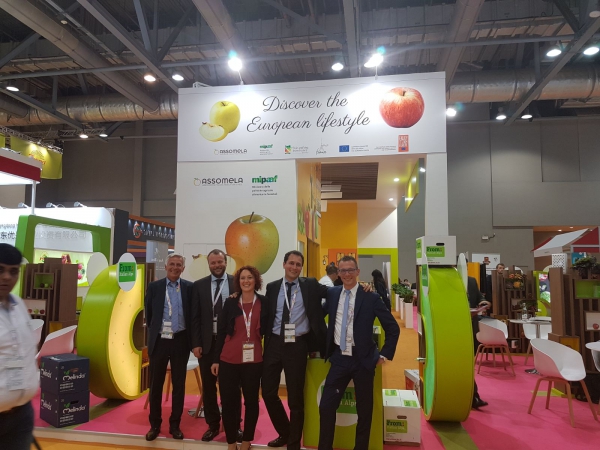Italy is a step closer to achieving market access for its apples in two major Asian markets, breakthroughs which would provide some welcome relief to an industry that has not been able to diversify its export portfolio in any way since Russia banned exports of all EU fruit back in August 2014.
EUROFRUIT understands that a team of officials from Vietnam is due to visit and inspect apple production and packing sites in Trentino-South Tyrol and Piedmont during the third week of September, with another team from Taiwan conducting similar inspections in early October.
“They have done a pest risk assessment and are coming here to evaluate packhouses and so on,” reveals Giulia Montanaro of Assomela, the association of Italian apple marketers and suppliers that represents more than 80 per cent of the country’s apple production.
The question of when access to the two countries in question might be secured remains unanswered, however. “That’s the million dollar question,” Montanaro adds. “It all depends on the inspectors’ reaction and the reports they file afterwards. These things happen on a ministry to ministry level, so they take time. But we know it could be concluded quickly because Poland took a year or a year-and-a-half in Vietnam. So we’re hoping to do the same.”
Italy’s apple suppliers are running at full pelt in a race to develop their exports and, in that context, have achieved some improved results in certain countries – for example Brazil and Canada. Exports of Italian apples to Brazil have rocketed, with official ITC trade figures up to May 2017 showing a volume of 32,241 tonnes were shipped this season compared with just 4,268 during the whole of 2015/16; that increase has pushed export revenues to €29.8m tonnes, again not including post-May sales, versus a full-season result of €3.9m during the previous campaign.
In Canada, meanwhile, export volumes and sales to May 2017 stood just above 4,000 tonnes and €3.9m respectively, compared with 2,276 tonnes and €2.3m in 2015/16.
No new markets
However, that success has come despite an apparent lack of sufficient progress on the part of the Italian government in securing access to new markets; the fact is that not a single new market opening for Italian apples has been achieved since the Russian ban on EU fruit imports was imposed in August 2014.
“The current line-up of importer countries certainly owes much to a reordering of the market that followed the closure of the Russian market [in 2014], which had severe consequences for the European apple market,” Montanaro (pictured below) explains.
“Italy wasn’t alone in seeing its exports to Russia decimated, but nonetheless it faced aggressive competition from its rivals – above all Poland – which ‘invaded’ markets that had previously been almost exclusively the preserve of Italian producers.
“This evidently brought about not just negative consequences in terms of market share, but also a race to research new markets. The feeling among companies in the sector, however, is that the number of commercial opportunities has diminished post-embargo, rather than increased.”
Despite other notable success stories – India, for example – South Tyrolean apple companies have encountered tough trading conditions in certain countries where expansion has been evident in previous years.
Egypt, which proved to be an excellent outlet for Italian apples in 2015/16, drastically reduced its imports following a devaluation of its currency and subsequent inflation. “In addition, a limit imposed by the government on high-value (dollar) payments out of Egypt reduced the buying power even of the better-organised importers,” Montanaro notes.
In Algeria, meanwhile, another previously very promising market for Italian apples, a government decision to introduce an ad-hoc apple import licence scheme proved in effect to be a block on Italian imports.
“So, as well as the loss of the Russian market, exporters had to deal with closures – albeit less obvious ones – in their key markets,” Montanaro concludes. “For this reason, at a national and European level, the Russian ban has encouraged the authorities to open new markets. And yet, since Russia’s official closure in August 2014, not a single new market for Italian apples has been opened.”
Presence in Asia
With many of Italy’s apple export companies, including Vog, VI.P Val Venosta and Melinda/La Trentina, exhibiting at this week’s Asia Fruit Logistica trade fair in Hong Kong, the hope for Assomela and its members will be that demand for high-quality European fruit will encourage better trade links with highly promising Asian markets in the very near future.
While countries in south-east Asia, as well as the continent’s largest market China, continue to be off-limits to Italian apple producers (as it is incidentally in Mexico, Peru and Chile), there is at least the glimmer of hope that better-organised and better-informed efforts on the part of the Italian government might help the trade match some of the results achieved by other European apple sources like Poland and France.
“In south-east Asia and China, you need to open bilateral negotiations if you want to define a protocol that will permit access for a specific item of fresh produce; the barriers are typically phytosanitary and non-tariff barriers, which block access to goods – especially fresh produce – coming from outside the region,” Montanaro explains.
“In the case of China, the first official exchanges between the Italian authorities from the Ministry of Agriculture and the Chinese authorities at AQSIQ have begun. But China has demonstrated itself to be rather negative in relation to Italy’s request to open negotiations for both apples and pears, as it did for its negotiation with Argentina some years ago, arguing repeatedly that market access dossiers can only be for a single product.”
With the negotiation of a fruit import protocol with China reckoned to take around ten years, the prospect might still seem far off. But with such a protocol for Italian citrus concluded just a few months ago, there is more chance than ever before that a similar breakthrough for apples might eventually be reached.
Articolo originale: http://www.fruitnet.com/eurofruit/article/173308/italy-apple-exporters-target-vietnam-and-taiwan

